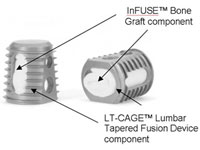
Personal injury lawsuits over its controversial Infuse bone-growth protein are beginning to pile up for Medtronic Inc. (NYSE:MDT), after the Spine Journal revealed serious concerns about the device’s safety this summer.
In June, the journal took the unprecedented step of devoting an entire issue to the Infuse controversy. Its investigation found problems with 13 studies by MDT-sponsored physicians, all of which downplayed or omitted the rates of adverse events associated with the protein, known as recombinant human bone morphogenetic protein-2.
Although the furor ignited by the study eventually died down on Wall Street (where analysts warned of a possible 3-cent-per-share dip in overall profits), Medtronic and Infuse are under intense scrutiny elsewhere. The U.S. Justice Dept. and the U.S. Senate are each conducting probes into the bone morphogenetic compound and its Fridley, Minn.-based maker’s marketing practices.
Sign up to get our free newsletters delivered straight to your inbox
Now Jennifer English is the latest in what’s likely to become a long line of plaintiffs to file personal injury suits against the Fridley, Minn.-based medical device colossus. The of Lake Worth, Fla., woman was implanted with an Infuse device in August 2007, according to court documents. But the rhBMP-2 embedded in the device allegedly caused ectopic bone growth that compressed nerves and required two revision surgeries to remove the out-of-control bone growth.
“I trusted Medtronic with my life,” English said in prepared remarks. “It is disappointing to find out Medtronic is not looking out for the best interests of the patient, but for own its financial interests.”
English’s complaint accuses Medtronic of fraudulently misrepresenting the device’s risks and of improperly promoting and marketing Infuse for off-label uses, according to documents filed with the U.S. District Court for Southern Florida.
Medtronic spokesman Steve Cragle told MassDevice in July that the company hasn’t “heard any feedback from our customers that they are reducing their expected use.” Infuse, Cragle told us, is a “physician-pull product,” meaning that Medtronic reps don’t actively promote it and aren’t compensated for any Infuse sales.
“So it’s up to the physician to determine when to use our product,” Cragle wrote in an email.
Medtronic pulls down between $700 million and $750 million from Infuse alone, analysts estimate.
Read more medical device legal news from MassDevice.com
Beckman Coulter settles class-action shareholders’ suit for $5.5 million
Beckman Coulter Inc. agreed to pony up $5.5 million to settle a class-action shareholders’ lawsuit accusing it of failing to disclose regulatory and quality issues in time to prevent damage to its share price.
The Brea, Calif.-based company, which was acquired by Danaher Corp. (NYSE:DHR) for $6.8 billion in February, asked Judge Josephine Tucker of the U.S. District Court for Central California to approve the settlement agreement between Beckman and the plaintiffs, led by the Arkansas Teacher Retirement System and the Iron Workers District Counsel of New England Pension Fund.
The securities fraud class action alleged that Beckman and its management made “material misstatements and omissions regarding product quality, safety, United States Food and Drug Administration regulatory compliance and the company’s troponin test kits, as well as likely customer retention, recurring revenue, business prospects, and earnings forecasts and guidance,” according to court documents.
“Lead plaintiff alleges that defendants failed to make earlier disclosure of alleged non-compliance with FDA pre-market notification requirements concerning modifications made to the company’s troponin tests, and failed to make earlier disclosure of the effects of noncompliance on the company’s operations, products and prospects,” according to the documents.
If approved by Tucker, would see the plaintiffs receive $ 5 million in cash; Beckamn would pay another $500,000 “for the expenses incurred in providing notice to the class and administering the settlement,” according to the documents.


